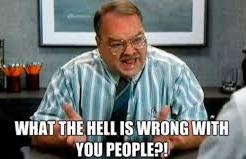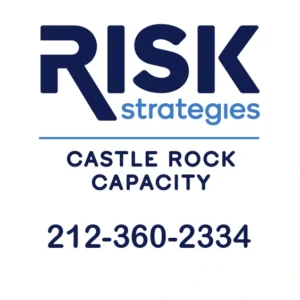The following are the top 61 Buzzwords you need actually, literally need to stop using, irregardless of anything, ever. The worst thing is, in addition to helping to derail meeting with these overly abused terms, they make you sound like you just swallowed an entire Tony Robbins library.
- 30,000-foot view. The big picture. This overview is from quite a distance. And at 5.6 miles above ground, you can’t see much detail from there.

- 800-pound gorilla. This mammal is really big, as are the obstacles and challenges named after it. However, the average gorilla weighs between 300 and 485 pounds, so an 800-pound gorilla might need to lay off the carbohydrates.
- Actually. As in I actually, literally had to call someone on the telephone.
- All hands on deck. All available employees are needed to complete a task or project, but bringing a life preserver is optional.
- Analysis paralysis. Over-thinking, which results in work that goes nowhere. In other words, “Make a decision, will ya?”
- Bandwidth. Capacity, as in, “Can you take on yet another project?”
- Best in breed. The best product or service of its kind. Used when best in class isn’t enough. Or what the finalists in the Westminster Dog Show are called. Woof!
- Big boy pants. Attire needed to take on a tough task. We mean figuratively, of course. Using this phrase could be considered offensive and condescending.
- Big data. A lot of data. This catchphrase is considered holy by computer types who love to talk about lots and lots of data and how data relates to everything.
- Bleeding edge. A product or service so new it probably still has bubble wrap sticking to it. Used when cutting edge isn’t enough.
- Brainstorm. An idea, and an example of a jargon-turned-accepted word. This word is now accepted even in academia
- Brick and mortar. A company that does business from a physical address, and is the opposite of an online-only company. This phrase begs the question: What about buildings made from other materials?
- Bucket. The figurative place similar projects and products go.
- Change agent. The person, product or idea that makes change—not the coin kind.
- Circle back. Revisiting a project, usually with other employees. Especially important if you forgot to close the loop. Just don’t get dizzy.
- Client-facing systems. Anything that interacts with clients, including an ATM, dry cleaner, telemarketer or phone app.
- Close the loop. Finished up, as in, “I just closed the loop after circling back with Bill on the client-facing systems project.”
- Consumer-driven. When one needs to emphasize that a product or service is meant to serve consumers. One question: Why else would someone be in business?
- Core competencies. Initially a management concept, these are the unique characteristics or strengths of a business or employee. Those demonstrating only peripheral excellence may work elsewhere.
- Customer-focused. See consumer-driven.
- Deep dive. A comprehensive immersion into anything. When you need more than a 30,000-foot view on a subject.
- Deliverable. Any product or service ready for market, or whatever the next step may be. It’s much easier to just name what you will deliver.
- Disrupt. Shattering the status quo. This action destroys analysis paralysis.
- Do more with less. Getting by with limited resources. Some businesses and families have great experience doing this.
- Drink the Kool-Aid. A phrase meant to say everyone is with the program. This phrase’s origin is the horrific 1978 Jonestown Massacre, when many of the more than 900 people died by drinking a flavored water drink, Fla-Vor-Aid. With time, the phrase incorrectly referenced Kool-Aid.
- Elephant in the room. The big issue, stumbling block or other obstacle. Offensive to elephants.
- Engagement. The act of talking with employees and customers.
- Face time. The act of talking to someone in person, and not via your media device.
- Front end. The part of your company everyone sees, the customer-facing end of a process.
- Going forward. Looking ahead or to the future, because it’s hard to make progress when going backwards.
- Hack. An easy way of doing something. Not to be confused with criminals stealing your financial information online.
- Heavy lifting. Doing most of the work. Don’t forget your big boy pants for this difficult job.
- Ideation. The act of creating ideas. Really…
- Irregardless. It’s not even a word. don’t ever use it, not even ever, not even in a joke.
- It is what it is. At a loss for words. For those times when no human can accurately describe what “it” is.
- Killing it. Doing something as well as possible. Do we need more business references to violence?
- Leverage. A noun now used as a verb to indicate using a strength to accomplish a business goal, as in, “I’m going to leverage the elephant in the room to do the heavy lifting so we’re literally killing it.” Poor “it.”
- Literally. The act of actually doing or saying something, compared to figuratively doing or saying something (e.g. working yourself to death). Now used incorrectly 99.6% of the time, when “figuratively” is the right word.
- Low-hanging fruit. An opportunity that is readily achieved or easily attained: easy pickings.
- Mission-critical. Means vital, crucial. Nothing works without it. Houston, we have lift-off!
- Move the goalposts. A change in plans, as in, “Did you have to change the project specs midstream?” Goalposts are very heavy, so you’ll need a few people to move them.
- Move the needle. Making a meaningful difference in the right direction, as long as no one moves the goalposts.
- Omni-channel. Your product or service is everywhere, as in, “Contact us by phone, fax, online, phone app, in person or Pony Express.”
- On my plate. Every task that needs doing. The more that’s on your plate, the less bandwidth you have.
- Onboarding. This is how companies assimilate new employees, and hopefully not what HR does to bad employees.
- On your radar. The tasks you know about, as opposed to those under the radar. That plate, with more work than hours in a day, is on everyone’s radar.
- Out of pocket. You’re just not available. Shut the phone off. . . . Really!
- Out of the box. Different or unusual, as in, “Finally, they let me out of the box! It was stuffy in there.”
- Paradigm shift. A big change, maybe prompted by a change agent’s ideation.
- Parking lot this. Stopping a discussion on an off-topic issue. This hush-hush conversation can actually happen in a parking lot outside the work environment. We’re not sure where to go when a company doesn’t have a parking lot.
- Reach out. The simple act of getting in touch with someone. Usually no more than a call back or email.
- Rightsizing. First cousin to restructuring, reorganization and downsizing. (Although people who lose their jobs due to rightsizing usually don’t feel right about it.)
- Rockstar. A really big corporate star, as evidenced by the combining of two words into one.
- Scalable. Usually means adapting to increasing demands. Sounds fishy.
- Sea change. Big change. Really, really big. Like the impact an 800-pound gorilla might have when falling from a 30,000-foot perch.
- Space. Another word for domain or field. The technology space. The small business space. 55. Start a Dialogue. Or you could just talk.
- Synergy. Working together. This term is an oldie but goodie.
- Take this offline. To have a private conversation. This is the most common request ending a conference call.
- Thought leadership. Demonstrated by an authority on a particular subject. For those times when expertise isn’t enough.
- Value-added. Implies more than you paid for. Does this mean the product didn’t add value before?
- What’s on your plate? A good question to ask if employees want to compare their workloads. Usually a question you might ask before crowding someone’s plate with another job.

